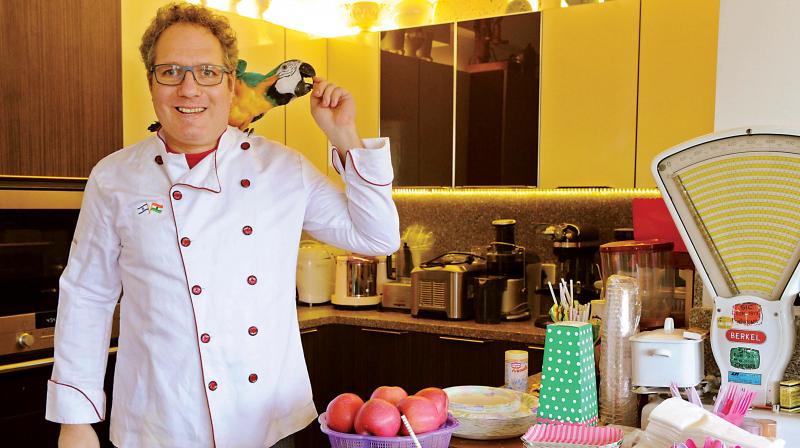DC's Gamechangers: For this chef, life's just a bowl of Mizrahi cherries

It’s a hot afternoon in Bengaluru and we brave rigorous security checks before we are allowed to enter the home of the Israeli Consul General. Inside, we were met by a member of Israeli security, who, frisked us for weapons and let us into the couple’s living quarters.
The Consul General, Yael Hashavit, awaits us with her husband, Sachar Ascehgrau, whom we are here to meet. Sachar, a highly-trained chef, has helped curate five-star menus and infuse Israeli dishes into high-end dining in Bengaluru.
The kitchen, a veritable mise en place, is pristine and organised, with everything settled neatly in its place. Sachar rummages in a nearby cupboard and opens up a jar of cherries, offering us a sample as he says, “Israeli cooking today is a fusion of many styles. It's a building that has a base comprised of many different styles of cooking. In earlier times, people didn’t comprehend this change, without a yardstick by which to measure it! They weren’t aware of the fact that their cooking styles dissipated and merged with other cuisines. Today, thanks to modern technology, we know," he says.
This cultural integration stems from families themselves, with Chef Sachar being a noteworthy example. “My mother was Ashkenazi, a term used to describe someone of European lineage. She couldn’t cook and learned from a very sweet aunt of mine, who happens to be or Mizrahi, or Middle Eastern stock! Israeli cuisine as a whole contains a range of influences, Mizrahi, Ashkenazi and even the Sephardic style, which originated in the Mediterranean.”
Cauliflowers, pepper and tomato are common across different Israeli traditions and bear striking similarity to South Indian food, too. “The similarities in climate means we end up eating a lot of the same vegetables,” says the Chef, who draws a line at cooking meat with ghee. “Jewish dietary restrictions forbid cooking meat with dairy.” Vegetables are cooked with milder flavours, although Indian spices, a natural preservative, are used liberally with meat.
When prodded about which international cuisine he would love to master, Sachar sighs, "Japanese. Being the husband of an Israeli diplomat, gave me the chance to travel all over the world, including Japan. I love eating Japanese food, but can't cook it," he says with a smile.
So, how does he prefer to cook his food? "By touch, taste and smell. I learnt cooking by choice and I continue to rely on my instincts. A chef must know what to add and how much by the texture and fragrance of what is being cooked.
When asked about his experience working with Shangri-La Hotel's employees to help integrate Israeli dishes into the menu, he just gushes: "They are wonderful. Very professional."
What aspect of Israeli cuisine reminds him most of India? “Amba,” Sachar says at once, referring to the tangy, pickled condiment that is hugely popular in Middle Eastern cuisine. "Made of mangoes, vinegar, salt, mustard, turmeric, chili and fenugreek, similar to savoury mango chutneys, the pickle is a hot favorite among Israelis. Guess where the name originated,” he says playfully and adding: “The answer is Sanskrit! It is an affirmation of historical contact and trade between India and Israel during ancient times!"

